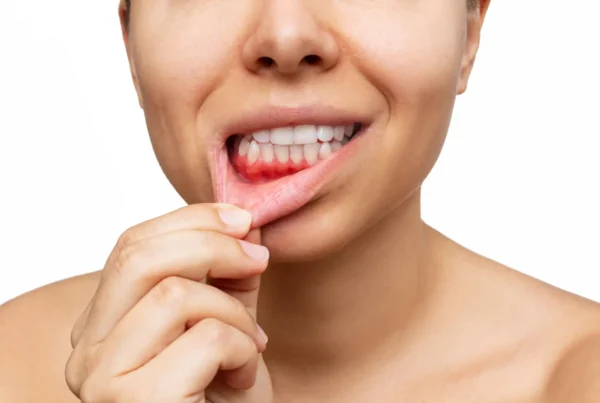What is tooth sensitivity?
Tooth sensitivity, also known as dentin hypersensitivity, manifests as sharp, short-lasting pain or discomfort in response to specific stimuli. These include hot or cold drinks, sweets, acidic foods, or even cold air. The pain results from exposed dentin—the layer beneath the enamel that contains microscopic tubules leading directly to the nerves. When enamel thins or gums recede, dentin becomes exposed to external factors, triggering sensitivity.
What causes sensitive teeth?
The most common cause is enamel erosion, which can result from acidic foods and drinks, brushing too hard with a stiff-bristled toothbrush, or teeth grinding (bruxism). Receding gums caused by gum disease or aging also contribute to dentin exposure. Sensitivity may also appear after dental procedures such as whitening, tartar removal, or fillings.
How can you reduce sensitivity?
The first step is identifying and eliminating the source. Gentle oral hygiene is crucial—use a soft-bristled toothbrush and a brushing technique that protects enamel and gums. Avoid excess consumption of acidic food and drink, and address habits like teeth grinding.
For mild cases, specially formulated toothpaste for sensitive teeth can help by strengthening enamel, sealing dentin tubules, and reducing nerve reactivity. In more serious cases, a dentist may recommend treatments like fluoride varnishes, desensitizing agents, or even root canal therapy if the pulp is affected.
Toothpaste plays a major role in daily management. Choosing the right one means looking at the ingredients that help protect exposed dentin and relieve discomfort.
Key ingredients in toothpaste for sensitive teeth
Good toothpaste for sensitive teeth often includes:
- Potassium nitrate – calms the nerves inside the tooth, reducing pain response.
- Sodium fluoride – strengthens enamel and supports remineralization.
- Hydroxyapatite – a natural mineral found in teeth, helps rebuild enamel and seal dentin tubules.
- Strontium chloride – creates a protective barrier over exposed dentin.
- Arginine – an amino acid that helps seal tubules and reduce sensitivity.
It’s important that the formula is gentle, with low abrasiveness (low RDA). Whitening toothpastes, especially those with activated charcoal or strong abrasives, are generally not recommended for people with sensitivity. Instead, opt for remineralizing toothpaste to soothe and protect both teeth and gums.
For best results, use sensitive toothpaste daily and avoid rinsing your mouth immediately after brushing—this allows active ingredients to continue working.
Best toothpaste for sensitive teeth – RANKING (*in no particular order)
Choosing the right toothpaste is essential for relief and long-term protection. Whether you’re looking for a fluoride-free formula, a natural option, or just solid everyday support, here are some top dentist-recommended choices:
- Smilesonic Sensitive – Features hydroxyapatite, which blocks fluid movement in the tubules and reduces sensitivity. Relief can be felt within days. Available at smilesonic.com.
- Elmex Sensitive Plus – Contains aminofluoride, which creates a protective coating over teeth, strengthens enamel, and soothes gums.
- WOOM Sensitive+ – Offers excellent defense against sensitivity while protecting enamel and preventing cavities. Also available: WOOM Total+, a whitening version that enhances enamel color by several shades.
- Parodontax Extra Fresh – Known for gum care, but also effective in treating sensitivity. Contains sodium fluoride and antibacterial agents for comprehensive protection.
- Biorepair Sensitive – Uses hydroxyapatite micro-repair particles to rebuild enamel and seal dentin tubules. A fluoride-free option that remineralizes naturally.
- Oral-B Pro-Expert Clinic Line Sensitive – Contains stannous fluoride, which forms a protective layer to reduce pain and prevent plaque buildup.
Final thoughts – sensitive teeth and gums are common
Tooth sensitivity can significantly impact daily life. Prevention and relief start with proper hygiene, avoiding triggers, and choosing the right toothpaste. If symptoms persist, consult a dentist for additional care.
Hopefully, this guide helps you find the best toothpaste for your needs and keeps your smile strong and pain-free.






